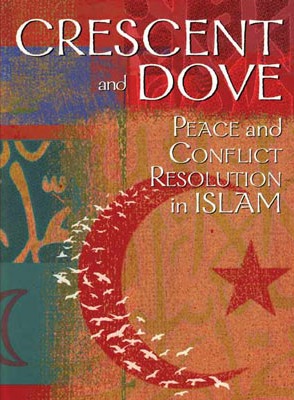The Nonviolent Crescent: Eight Theses on Muslim Nonviolent Actions
by Chaiwat Satha-Anand

Book jacket art courtesy usip.org
From 1982 to 1984, Muslims from two villages in Ta Chana district, Surat Thani, in southern Thailand had been killing one another in vengeance; seven people had died. Then on January 7, 1985, which happened to be a Maulid day (to celebrate Prophet Muhammad’s birthday), all parties came together and settled the bloody feud. Haji Fan, the father of the latest victim, stood up with the Holy Qur’an above his head and vowed to end the killings. With tears in his eyes and for the sake of peace in both communities, he publicly forgave the murderer who had assassinated his son. Once again, stories and sayings of the Prophet had been used to induce concerned parties to resolve violent conflict peacefully. (1) Examples such as this abound in Islam. Their existence opens up possibilities of confidently discussing the notion of nonviolence in Islam. They promise an exciting adventure into the unusual process of exploring the relationship between Islam and nonviolence.
This chapter is an attempt to suggest that Islam already possesses the whole catalogue of qualities necessary for the conduct of successful nonviolent actions. An incident that occurred in Pattani, Southern Thailand, in 1975 is used as an illustration. Finally, several theses are suggested as guidelines for both the theory and practice of Islam and the different varieties of nonviolence, including nonviolent struggle.
Read the pdf of the complete article here: The Nonviolent Crescent
EDITOR’S NOTE: Chaiwat Satha-Anand is Professor of Political Science, Thammasat University (Thailand), and Director of the Peace Information Center, Foundation for Democracy and Development Studies. In 2012 he was winner of the El-Hibri Peace Education Prize, which recognized Prof. Satha-Anand’s “contribution to the field of Peace Education.” We are grateful to Prof. Satha-Anand, and to Nonviolence International for permission.




